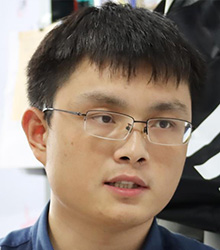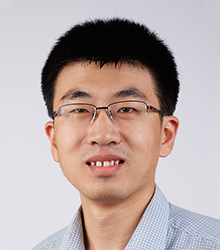Symposiums--SIGSAC China
The ACM TURC 2021 (SIGSAC CHINA) conference is leading international forum for academia, government, and industry to present novel research results in various practical and theoretical aspects of cybersecurity. All topic areas related to cyber security and data privacy are within the scope. The ACM TURC 2021 (SIGSAC CHINA) is technically supported by ACM SIGSAC China, which is committed to the research in the fields of security, audit and control, and is the China branch of the world's largest computer security research organization.
Organizers
General Chairs
Sheng Zhong (Nanjing University, China)
TPC Co-Chairs:
Qi Li(Tsinghua University, China)
Hui Zhu(Xidian University, China)
Meeting schedule
| Date(2021-07-31)Location(Meeting Room No.1+2) | ||||
| Time | Talks | Moderator | Speaker | |
| 14:00 - 14:10 | Openning Remarks | Sheng Zhong, Nanjing University | Sheng Zhong, Nanjing University | |
| 14:10-14:50 | Keynote 1 | Privacy Computing: Moving Towards Practicality | Qi Li, Tsinghua University | Kui Ren,Zhejiang University |
| 14:50-15:20 | Keynote 2 | Multidimensional Countermeasure in Data Security | Qi Li, Tsinghua University | Weixin Liu, Ant Group |
| 15:20-15:40 | Tea Break | |||
| 15:40-16:00 | Academic Report 1 | Android Custom Permissions Demystified | Zhen Ling, Southeast University | Wenrui Diao, Shandong University |
| 16:00-16:20 | Academic Report 2 | Vulnerability Research on Open-source Software | Zhen Ling, Southeast University | Yuan Zhang, Fudan University |
| 16:20-16:40 | Academic Report 3 | Cryptography in the Post-Snowden Era: Attacks and Defenses | Zhen Ling, Southeast University | Rongmao Chen, National University of Defense Technology |
| 21:00-21:40 | Keynote 3 (online) |
Analyzing Proximity-based Contact Tracing Protocols | Qi Li, Tsinghua University | Ninghui Li, Purdue University |
| Date(2021-08-01)Location(会议室名称) | ||||
| Time | Talks | Moderator | Speaker | |
| 14:00-14:20 | Academic Report 4 | Exploiting and Securing AI from the Cyber Security View | Hui Zhu, Xidian University | Guozhu Meng, Institute of Information Engineering,Chinese Academy of Sciences |
| 14:20-14:40 | Academic Report 5 | Provable Security of Symmetric Cryptography and Some Problems That It Solves | Hui Zhu, Xidian University | Chun Guo, Shandong University |
| 14:40-15:00 | Academic Report 6 | Efficient Implementation of Anonymou Credentials, and Study on Its Applications | Hui Zhu, Xidian University | Jianan Hong, University of Science and Technology of China |
| 15:00-15:20 | Academic Report 8 | Mining Cross-layer Vulnerabilities in Mobile Software System | Kaiping Xue, University of Science and Technology of China | Lei Zhang, Fudan University |
| 15:20-15:40 | Tea Break | |||
| 15:40-16:00 | Academic Report 7 | Research on Novel Cryptanalytic Methods for Symmetric-Key Primitives | Kaiping Xue, University of Science and Technology of China | Lin Sun, Shandong University |
| 16:00-16:20 | Academic Report 9 | Attack and Defense Strategies: Toward Smart Mobile Devices | Kaiping Xue, University of Science and Technology of China | Yao Wang, Xidian University |
Keynote Speaker

Keynote: Analyzing Proximity-based Contact Tracing Protocols

Ninghui Li
Professor of Computer Science at Purdue University
Abstract:The COVID-19 pandemic is shaping up to be among the biggest disasters for humanity since World War 2. Traditional contact tracing requires extensive manual efforts and scales poorly. As smartphone usage is ubiquitous in modern society, the use of smartphone apps to help with contact tracing is a promising solution. In Proximity-based Contact Tracing (PCT) systems, the goal is to identify events where two persons are physically close to each other, by detecting that their smartphones are physically adjacent for some period of time. The challenge is how to do this while balancing Privacy of individuals, Resiliency to malicious attackers, and Efficiency. In this talk, we present a systematic approach to design and analyze PCT protocols. We identify a list of desirable properties of a contact tracing design from the four aspects of Privacy, Utility, Resiliency, and Efficiency (PURE). We also identify two main design choices for PCT protocols: what information patients report to the server, and which party performs the matching of patient and contacts. These two choices determine most of the PURE properties and enable us to conduct a comprehensive analysis and comparison of the existing protocols. This also led us to discover a new design and offers attractive combination of properties. See https://arxiv.org/abs/2012.09520 for the paper.
Biography: Ninghui Li is a Professor of Computer Science at Purdue University. His research interests are in security and privacy. He has published over 120referred papers in these areas, and is on the editorial boards of ACM Transactions on Privacy and Security (TOPS), Journal of Computer Security(JCS), and ACM Transactions on Internet Technology. Prof. Li is Vice Chair of ACM Special Interest Group on Security, Audit and Control (SlGSAC). He has served on the Program Committees of over 100 international conferences and workshops in computer security, databases, and data mining, including serving as Program Committee Chairs for 2014 and 2015 ACM Conference on Computer and Communications Security (CCS),ACM's flagship conference in the field of security and privacy.

Keynote: Privacy Computing: Moving Towards Practicality

Kui Ren
Dean, School of Cyberspace Security, Zhejiang University
ACM fellow and IEEE fellow
Abstract:
BIO:浙江大学求是讲席教授、ACM会士和IEEE会士、国家特聘专家,目前担任浙江大学网络空间安全学院院长、计算机科学与技术学院副院长、计算机创新技术研究院执行院长,并曾担任纽约州立大学布法罗分校冠名教授及普适安全与隐私实验室主任。先后主持和参与了科技部、国家自然科学基金委员会、浙江省领军型创新团队、美国国家科学基金会、美国能源部、香港研究资助局、韩国国家研究基金会、阿里巴巴、蚂蚁金服、华为、亚马逊等机构和公司的多项科研项目,多项研究成果在工业界有广泛应用。获得了包括浙江大学首届国华杰出学者奖,IEEE通信分会安全技术委员会技术成就奖 、纽约州立大学校长杰出研究奖 、美国国家自然科学基金青年职业奖在内的一系列奖项。发表了300余篇同行评议的期刊与会议文章,获得了包括IEEE ICDCS’20、ACM MobiSys’20、IEEE INFOCOM’20、IEEE Globecom’19、中国密码学会’18、ACM/IEEE IWQoS’17,IEEE ICNP’11等在内的多篇最佳论文和时间考验论文奖。H-Index为77,文章总引用次数超过35,000次,并入选科睿唯安高被引科学家。任奎教授担任了多个国际权威期刊编委,国际一流会议主席或共同主席,包括现/曾任《中国科学:信息科学》、《ACM互联网技术汇刊》、《ACM信息物理系统汇刊》、《ACM物联网汇刊》、《IEEE网络汇刊》、《IEEE可信任安全计算汇刊》、《IEEE服务计算汇刊》、《IEEE移动计算汇刊》、《IEEE网络科学与工程汇刊》、《IEEE信息取证与安全汇刊》、《IEEE无线通信杂志》、《IEEE物联网期刊》、《IEEE智能电网汇刊》、《Elsevier 计算机网络期刊》、《ZTE Communications》、Springer安全系统与网络书系、中国计算机学会网络汇刊、电子学报 (英文版)和网络及信息安全学报等的编委和副主编。任奎教授同时担任第八届教育部科学技术委员会委员、教育部高等学校教学指导委员会委员、ACM亚洲计算机与通信安全会议指导委员会委员、ACM中国安全分会主席,中共浙江省委网络安全和信息化委员会专家咨询委员会咨询专家、浙江省数字社会系统建设专家组召集专家以及浙江省海高会青年分会首任会长等社会职务。

Keynote: Multidimensional Countermeasure in Data Security

Weixin Liu
Security Expert of ANT FINANCIAL SERVICES GROUP
Abstract:随着《中华人民共和国数据安全法》在今年人大会议通过,并于2021年9月1日起施行,昭示着数据安全已在安全建设中成为不能回避且应切实落地的主题。数据安全的核心是流动性风险,核心难点包括但不限于:面对敏感数据的多样性,如何应用弱监督学习、主动学习和NER等技术解决数据不均衡下的高精准识别;面对快速膨胀的数据流动路径,如何在元数据缺乏和血缘关系高达数百层的数据链路中,应用图计算和图神经网络解决链路溯源加速和资产发现的难题;面对数据行为风险,如何从海量的行为数据中构建面向员工、设备、内容的风险画像,辅助异常事件定性和威胁证据链还原。本次演讲将介绍蚂蚁天堑实验室在敏感资产识别、数据链路刻画、流动性威胁分析和数据安全运营等方面的实战心得。
BIO:刘威歆,蚂蚁集团安全专家,北京邮电大学博士,清华大学博士后。加入蚂蚁前,曾担任绿盟创新中心首席研究员、安全大数据实验室负责人等职务。曾获北京市科技新星、世界互联网领先科技成果、网络安全创新产品(技术)二等奖等6项荣誉,主持和参与11项国家及省部级课题,参与建设的DDoS攻击溯源和团伙跟踪项目获得2020中国电子学会科技进步一等奖。作为主要起草人,参编威胁情报相关国家标准1项,该标准已经发布实施。擅长领域是攻击溯源分析、威胁情报建设和大数据量下的算法应用。目前是蚂蚁集团天堑实验室的算法一号位,主要负责对抗智能、数据安全和智能审计相关业务。
Exchange report

Title: Provable security of symmetric cryptography and some problems that it solves

Chun Guo
Shandong University
Abstract:
BIO:

Title: Vulnerability Research on Open-source Software

Yuan Zhang
Fudan University
Abstract:
BIO:

Title: Cryptography in the Post-Snowden Era: Attacks and Defenses

Rongmao Chen
National University of Defense Technology
Abstract:
BIO:

Title: Android Custom Permissions Demystified

Wenrui Diao
Shandong University
Abstract:
BIO:

Title: Exploiting and Securing AI from the Cyber Security View

Guozhu Meng
Institute of Information Engineering,Chinese Academy of Sciences
Abstract:
BIO:

Title: Research on novel cryptanalytic methods for symmetric-key primitives

Ling Sun
Shandong University
Abstract:
BIO:

Title: Mining Cross-layer Vulnerabilities in Mobile Software System

Lei Zhang
Fudan University
Abstract:
BIO:

Title: Attack and Defense Strategies: Toward Smart Mobile Devices

Yao Wang
Xidian University
Abstract:
BIO:

Title: Efficient Implementation of Anonymou Credentials, and Study on Its Applications

Jianan Hong
University of Science and Technology of China
Abstract:
BIO:
Call for Papers
Topics of Interest
Topics of interest include but are not limited to the following:
Symmetric Key Cryptosystems
• Cryptanalysis
• Hash Functions
• Key Management
• Digital Signature
• Cryptographic protocols
• Provable Security
• Implementation of Cryptosystems
Security and Privacy
• Privacy-preserving techniques
• Private information retrieval
• Data leak detection and prevention
• Data-dissemination controls
• Data forensics
• Secure knowledge management
• Secure multiparty computation
• Secure software development
• Securing the semantic web
• Secure auditing
Applications
• Search on protected/encrypted data
• Security and privacy in GIS/spatial data
• Security and privacy in healthcare
• Security and privacy in the Internet of Things
• Access control for applications
• Social computing security and privacy
• Social networking security and privacy
• Trust metrics for applications, data, and users
• Usable security and privacy
• Web application security
SIGSAC China welcomes submissions on inter-disciplinary work, as long as there are clear contributions to management of data.
Instruction for Authors
Submitted papers must not substantially overlap papers that have been published or that are simultaneously submitted to a journal, conference or workshop. Simultaneous submission of the same work is not allowed. Submissions must be at most 6 pages in double-column ACM format (as specified at ACM Proceedings Template). Only PDF files will be accepted. Submissions not meeting these guidelines will be rejected without review. Submissions should be made electronically at EasyChair SIGSAC 2021.
Important Date
Abstract and title registration: May 14, 2021 22:00 AOE
Paper submission: May 20, 2021 22:00 AOE
Notification of acceptance: June 20, 2021
Camera-Ready: June 30, 2021

